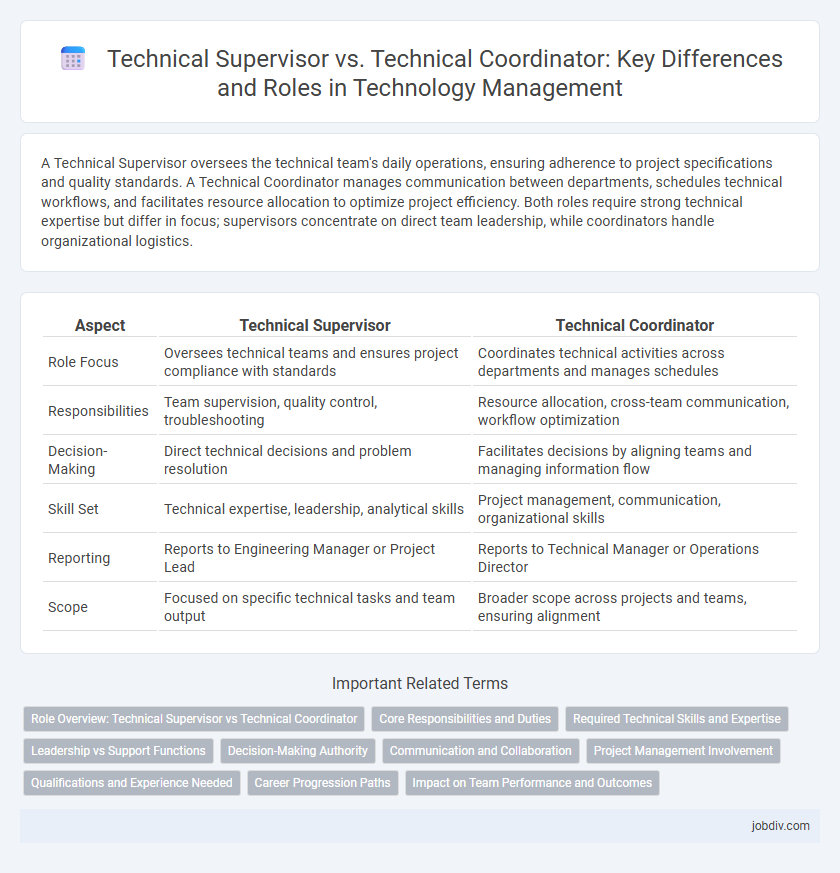A Technical Supervisor oversees the technical team's daily operations, ensuring adherence to project specifications and quality standards. A Technical Coordinator manages communication between departments, schedules technical workflows, and facilitates resource allocation to optimize project efficiency. Both roles require strong technical expertise but differ in focus; supervisors concentrate on direct team leadership, while coordinators handle organizational logistics.
Table of Comparison
| Aspect | Technical Supervisor | Technical Coordinator |
|---|---|---|
| Role Focus | Oversees technical teams and ensures project compliance with standards | Coordinates technical activities across departments and manages schedules |
| Responsibilities | Team supervision, quality control, troubleshooting | Resource allocation, cross-team communication, workflow optimization |
| Decision-Making | Direct technical decisions and problem resolution | Facilitates decisions by aligning teams and managing information flow |
| Skill Set | Technical expertise, leadership, analytical skills | Project management, communication, organizational skills |
| Reporting | Reports to Engineering Manager or Project Lead | Reports to Technical Manager or Operations Director |
| Scope | Focused on specific technical tasks and team output | Broader scope across projects and teams, ensuring alignment |
Role Overview: Technical Supervisor vs Technical Coordinator
A Technical Supervisor primarily oversees technical teams to ensure project milestones and quality standards are met, focusing on hands-on problem-solving and direct team management. In contrast, a Technical Coordinator manages communication and collaboration across departments and stakeholders, optimizing workflow and resource allocation. Both roles are critical for project success but differ in scope, with supervisors emphasizing operational execution and coordinators enhancing cross-functional coordination.
Core Responsibilities and Duties
A Technical Supervisor oversees project execution, manages technical teams, and ensures adherence to quality standards and safety protocols. A Technical Coordinator facilitates communication between departments, schedules resources, and monitors project progress to maintain workflow efficiency. Both roles require strong technical knowledge, but Supervisors have direct leadership responsibilities, while Coordinators focus on organizational support and coordination.
Required Technical Skills and Expertise
Technical Supervisors must possess in-depth knowledge of engineering principles, project management software, and quality control standards to oversee technical teams effectively. Technical Coordinators require expertise in scheduling, resource allocation, and communication tools to ensure smooth project workflows and interdepartmental collaboration. Both roles demand proficiency in data analysis and problem-solving, but Supervisors emphasize technical execution while Coordinators focus on operational coordination.
Leadership vs Support Functions
Technical Supervisors primarily provide direct leadership by managing teams, making critical decisions, and overseeing project execution to ensure technical objectives are met efficiently. Technical Coordinators focus on support functions such as facilitating communication between departments, scheduling tasks, and ensuring resource availability to maintain smooth workflows. Leadership roles emphasize decision-making authority and team guidance, while support roles concentrate on organizing and coordinating operational activities.
Decision-Making Authority
Technical Supervisors possess higher decision-making authority, directing technical teams and resolving complex operational issues independently. Technical Coordinators primarily facilitate communication and coordinate tasks, with limited autonomy in strategic decisions. Their role centers on implementing guidelines established by supervisors or management.
Communication and Collaboration
Technical Supervisors enforce project protocols and directly manage team performance, ensuring clear communication of technical requirements and progress updates. Technical Coordinators facilitate interdepartmental collaboration by organizing meetings, aligning schedules, and managing documentation to streamline information flow. Both roles rely on effective communication tools and collaborative platforms to synchronize team efforts and achieve project milestones efficiently.
Project Management Involvement
Technical Supervisors oversee project execution by managing technical teams, ensuring adherence to timelines, and maintaining quality standards, playing a crucial role in daily project operations. Technical Coordinators focus on aligning project objectives with resources, facilitating communication between departments, and tracking progress through project management tools. Both roles are vital for successful project delivery but differ in scope, with Supervisors concentrating on technical execution and Coordinators managing coordination and administrative aspects.
Qualifications and Experience Needed
A Technical Supervisor typically requires a bachelor's degree in engineering or a related technical field, with at least 5 years of hands-on experience in project management and team leadership. A Technical Coordinator often needs a background in technology or administration, coupled with 3 to 4 years of experience in coordinating technical projects and liaising between teams. Both roles demand strong problem-solving skills, but the supervisor emphasizes direct technical expertise and decision-making, while the coordinator focuses on communication and organizational abilities.
Career Progression Paths
Technical Supervisors typically focus on overseeing daily technical operations and managing frontline teams, building expertise in process optimization and team leadership. Technical Coordinators advance by handling cross-departmental project coordination, resource allocation, and strategic planning, developing skills in multi-team collaboration and project management. Career progression often starts with a Technical Supervisor role before moving into Technical Coordinator positions, reflecting a shift from direct technical oversight to broader organizational responsibility.
Impact on Team Performance and Outcomes
A Technical Supervisor directly oversees team members' daily tasks, ensuring adherence to project specifications and quality standards, which results in improved precision and accountability in deliverables. The Technical Coordinator facilitates communication between departments and streamlines resource allocation, significantly enhancing workflow efficiency and cross-functional collaboration. Both roles are critical, but the Supervisor's hands-on management more strongly influences individual performance, while the Coordinator's role impacts overall team synergy and project milestones.
Technical Supervisor vs Technical Coordinator Infographic

 jobdiv.com
jobdiv.com